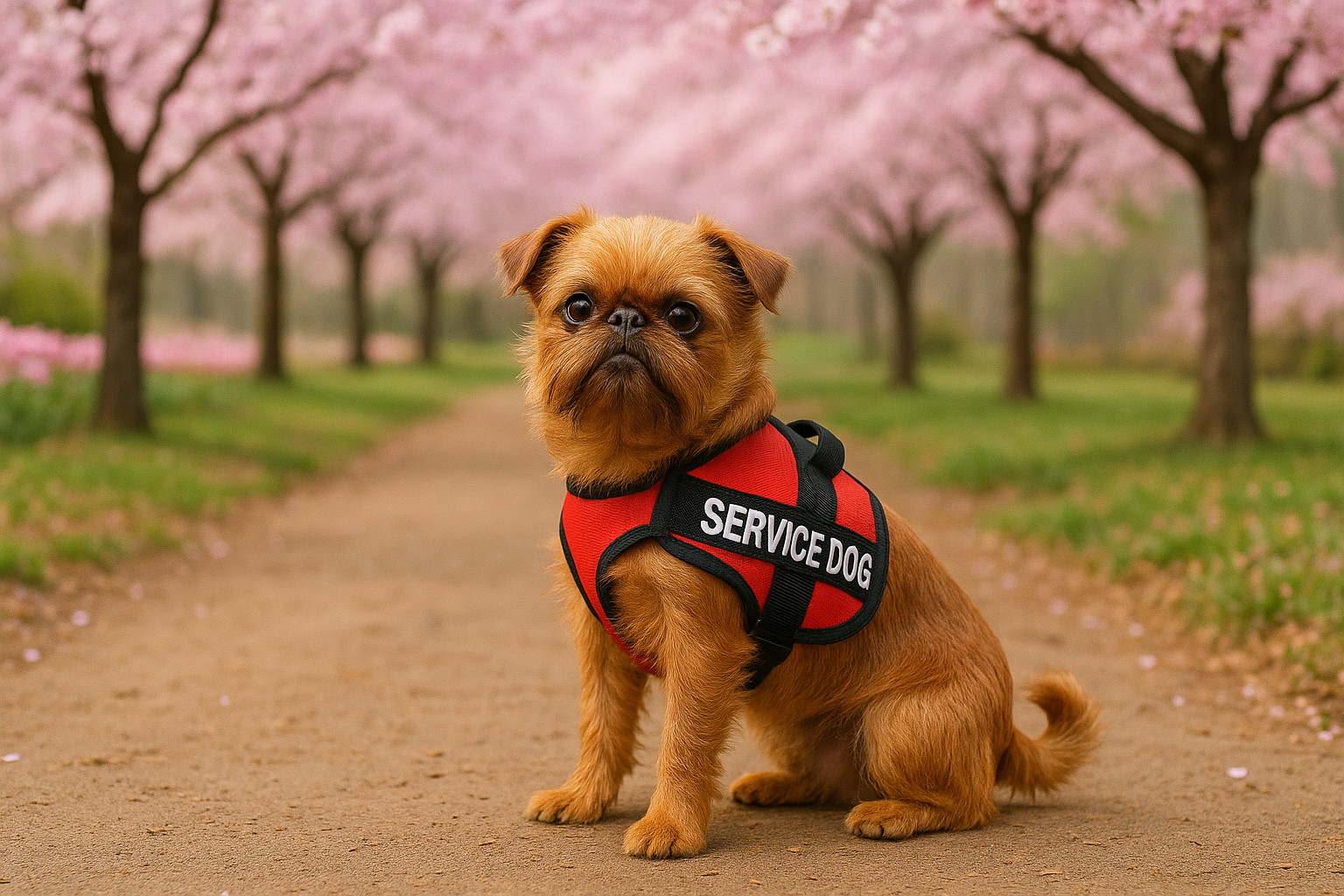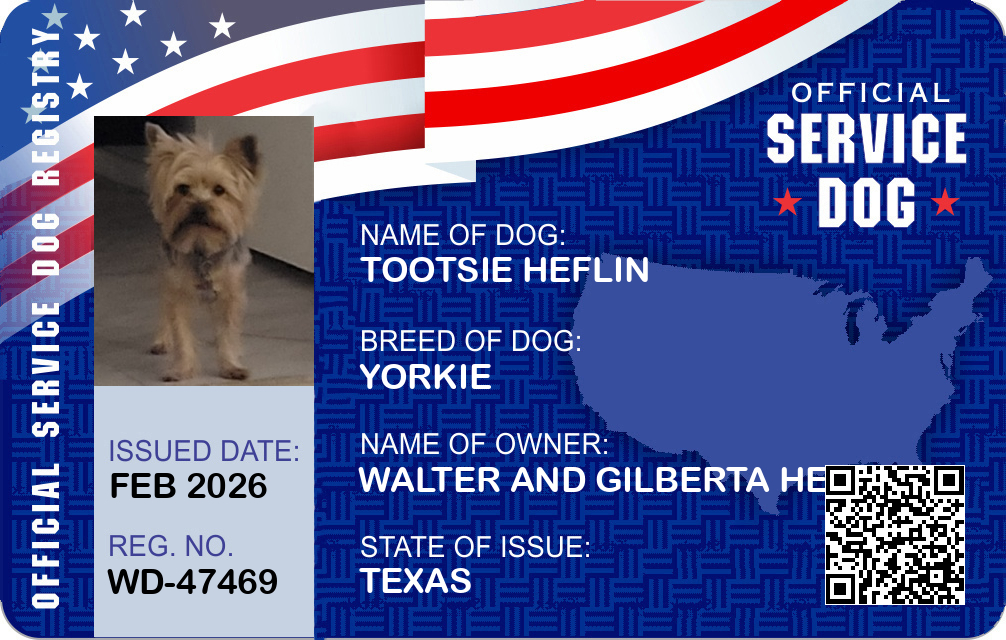Brussels Griffon as a Service Dog
Get Your Documents

The Brussels Griffon is an eye-catching small breed with a big personality. Known for their distinctive appearance and expressive eyes, they have grown increasingly popular as companions. However, when it comes to service work, concerns arise about their suitability. This article dives into the characteristics of the Brussels Griffon and evaluates their potential as a service dog, exploring various aspects such as physical attributes, temperament, types of service work, health considerations, training, and overall suitability.
Brussels Griffon Overview
The Brussels Griffon, originating in Belgium, is a breed beloved for its unique features and engaging personality. Their expressive faces and almost human-like expressions have captivated many fans worldwide. While primarily kept as companion animals, understanding their potential as service dogs requires a deeper dive into their attributes.
Physical Characteristics
The physical characteristics of the Brussels Griffon contribute both positively and negatively to its service dog potential. This toy breed typically weighs between 8 to 12 pounds and stands about 7 to 8 inches tall. Their small stature is a significant consideration for service work. It makes them inadequate for tasks requiring physical strength or endurance, such as mobility assistance. However, their compact size allows them to fit into small spaces, which is advantageous for individuals with limited space or those who need a service dog that can be easily carried.
Their appearance can be broken down into two varieties: the rough-coated and the smooth-coated. The rough coat gives them a somewhat scruffy look, while the smooth coat is sleek and easy to maintain. Regardless of coat type, regular grooming is necessary to keep their fur healthy and free of tangles. This grooming requirement can be a minor aspect to consider when thinking of them as potential service dogs, as some people may prefer low-maintenance breeds.
Temperament and Attitude
The temperament and attitude of the Brussels Griffon are distinct, with potential implications for service work. They are known for their charismatic, intelligent, and sometimes comical nature, which has earned them a reputation as delightful companions. This plays a critical role in their ability to be service dogs, as temperament is a key factor in a dog’s suitability for such roles.
Brussels Griffons are generally affectionate, geared towards forming strong bonds with their owners. This trait could serve them well in environments where deep emotional connections with their handlers are crucial, such as psychiatric or emotional support roles. However, they can also be highly sensitive and sometimes stubborn, which necessitates a gentle yet firm approach to training. Due to their high sensitivity, they might not perform well in high-stress environments or settings that require exposure to a great deal of stimulation.
Their intelligence means they are quick learners, capable of grasping commands readily. Yet, this same intelligence can lead to independent thinking, which might pose challenges during training, especially if inconsistent methods are used. Therefore, they require a trainer who can maintain balance—enforcing rules while providing positive reinforcement to encourage desired behaviors.
Types of Service Work
Given their small size and specific traits, Brussels Griffons are more suited for certain types of service work than others. Large-scale tasks requiring strength are typically out of reach for this breed, but they can flourish in roles that depend on their unique qualities:
- Emotional Support and Comfort: Thanks to their affectionate nature and desire to be close to their handlers, Brussels Griffons can be excellent emotional support animals. Their ability to bond deeply and provide comfort makes them valuable companions for individuals with anxiety, depression, or PTSD.
- Medical Alert: With proper training, their keen sense of smell can be harnessed for medical alert tasks, such as detecting minor changes in body chemistry. For example, they may alert individuals to blood sugar changes in diabetic handlers, although these roles require extensive and specialized training.
Despite these capabilities, the breed may not be suitable for tasks involving heavy physical interaction or environments demanding high endurance and resilience. As a result, they usually are not deployed as traditional service dogs that perform physical tasks.
Health Considerations
Health is a crucial factor in assessing any breed’s potential as a service dog. Brussels Griffons, like many purebred dogs, are prone to specific health problems that can impact their service dog suitability.
Common health issues for Brussels Griffons include:
- Respiratory Issues: The breed is brachycephalic (characterized by a short skull and flat face), which can lead to breathing difficulties, especially in hot or humid weather, or during physically strenuous activities. This condition limits their capability to work in environments where they might be exposed to heat or need to engage in vigorous activity.
- Patellar Luxation: This knee condition can cause lameness in the hind legs, which can be problematic for a dog expected to perform regular service tasks.
- Eye Problems: Due to their prominent eyes, Brussels Griffons are prone to eye infections and injuries, requiring vigilant care.
These health considerations may limit their working lifespan and their ability to perform consistently without interruption due to health flare-ups.
Training and Suitability
Training a Brussels Griffon for service requires patience and understanding. Their intelligence is a double-edged sword for training; it means they can quickly pick up cues and commands, but it also means they can become easily bored if training sessions are not engaging.
Effective training techniques for this breed focus on:
- Positive Reinforcement: Reward-based methods work well, as Griffons respond enthusiastically to treats and praise.
- Consistency and Structure: Establishing a clear training routine is essential to manage their sometimes willful nature.
- Socialization: Early and ongoing socialization is vital to ensure they are comfortable in various settings and around different stimuli.
Given these training requirements, Brussels Griffons might not be suitable for novice trainers. They thrive in scenarios where a knowledgeable handler can provide consistent and engaging guidance.
Summary of Brussels Griffon
In summary, the Brussels Griffon presents a unique profile as a potential service dog. Here are the key strengths, weaknesses, and ideal service roles:
- Strengths:
- Highly intelligent and capable of quick learning with engagement
- Strong bond-forming ability makes them excellent emotional support animals
- Small size allows easy transport and adaptability to confined living spaces
- Weaknesses:
- Prone to health issues such as respiratory problems and knee conditions
- Sensitivity and sometimes stubborn nature can challenge training
- Not suitable for physically demanding service tasks
- Ideal Service Roles:
- Emotional Support Animal
- Possible Medical Alert Dog (with extensive training)
Overall, while the Brussels Griffon’s charming disposition and intelligence are noteworthy, these small dogs may be more suited as companions and emotional support animals than traditional service dogs. Potential handlers should carefully evaluate both their needs and the breed’s unique characteristics to ensure a mutually rewarding partnership.
Get Your Documents
Example State Cards













